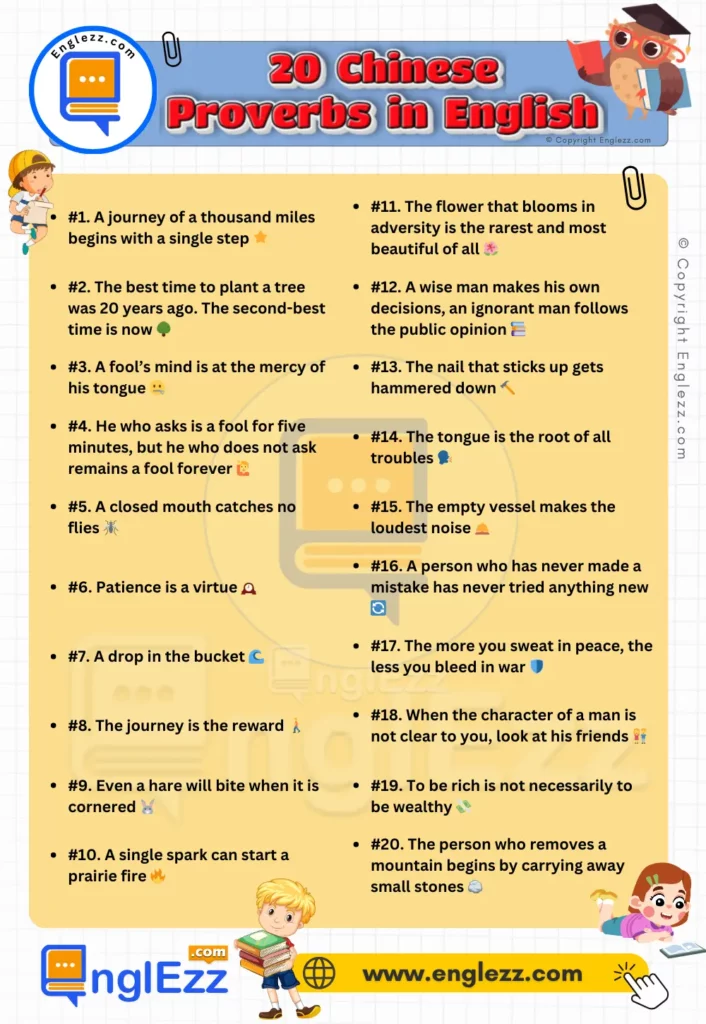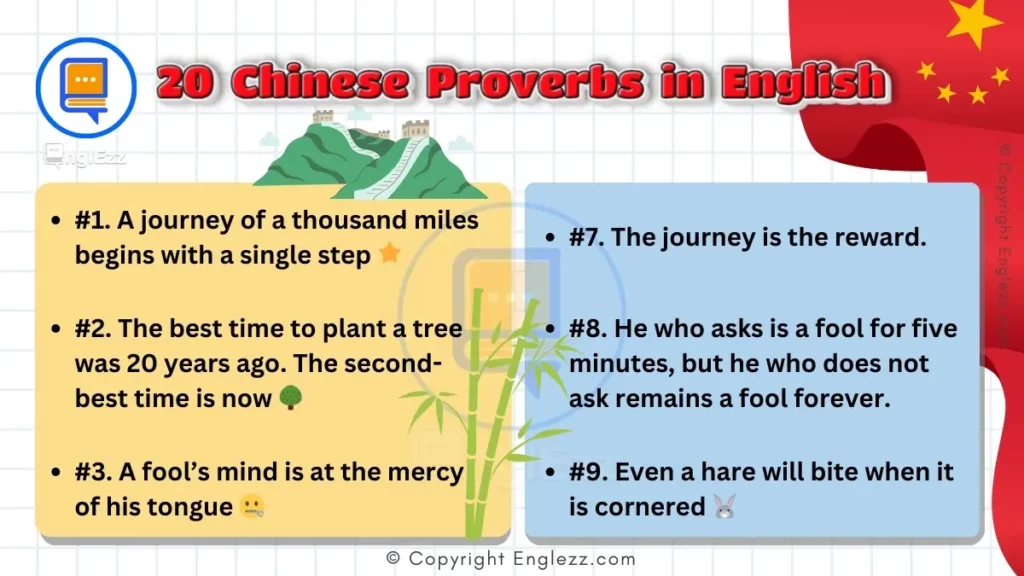Chinese proverbs offer a fascinating glimpse into the rich tapestry of Chinese culture and wisdom. These time-honored sayings reflect deep insights and universal truths that have resonated across centuries. They are more than just phrases; they encapsulate the essence of human experience and offer guidance on how to navigate life’s challenges. In this blog post, we will explore 20 Chinese proverbs in English, providing explanations and examples to help you understand and use them effectively.
Table of Contents
- 20 Chinese Proverbs in English with Examples
- #1. A journey of a thousand miles begins with a single step 🌟
- #2. The best time to plant a tree was 20 years ago. The second-best time is now 🌳
- #3. A fool’s mind is at the mercy of his tongue 🤐
- #4. He who asks is a fool for five minutes, but he who does not ask remains a fool forever 🙋
- #5. A closed mouth catches no flies 🦟
- #6. Patience is a virtue 🕰️
- #7. A drop in the bucket 🌊
- #8. The journey is the reward 🚶
- #9. Even a hare will bite when it is cornered 🐰
- #10. A single spark can start a prairie fire 🔥
- #11. The flower that blooms in adversity is the rarest and most beautiful of all 🌺
- #12. A wise man makes his own decisions, an ignorant man follows the public opinion 📚
- #13. The nail that sticks up gets hammered down 🔨
- #14. The tongue is the root of all troubles 🗣️
- #15. The empty vessel makes the loudest noise 🛎️
- #16. A person who has never made a mistake has never tried anything new 🔄
- #17. The more you sweat in peace, the less you bleed in war 🛡️
- #18. When the character of a man is not clear to you, look at his friends 👫
- #19. To be rich is not necessarily to be wealthy 💸
- #20. The person who removes a mountain begins by carrying away small stones 🪨
- Chinese Proverbs in English Table
- Chinese Proverbs in English Printable
- Conclusion
20 Chinese Proverbs in English with Examples
Whether you are a language enthusiast, a student of culture, or simply someone looking to enrich your vocabulary, these proverbs will offer valuable lessons and intriguing perspectives. Join us on this journey through ancient wisdom and discover how these proverbs can enhance your understanding of both Chinese culture and your own life experiences. For further learning, you can explore more resources on Englezz’s courses and English exercises.
#1. A journey of a thousand miles begins with a single step 🌟
Explanation: This proverb emphasizes the importance of taking the first step towards a goal, no matter how daunting it may seem.
Phonetic Transcription: /ə ˈdʒɜːrni əv ə ˈθaʊzənd maɪlz bɪˈɡɪnz wɪð ə ˈsɪŋɡəl stɛp/
Examples:
- Deciding to start a new project can be overwhelming, but remember, a journey of a thousand miles begins with a single step.
- She was nervous about moving to a new city, but she knew a journey of a thousand miles begins with a single step.
#2. The best time to plant a tree was 20 years ago. The second-best time is now 🌳
Explanation: This proverb highlights the importance of acting on opportunities sooner rather than later. It suggests that while past opportunities may have been missed, it is never too late to start anew.
Phonetic Transcription: /ðə bɛst taɪm tuː plænt ə triː wəz ˈtwɛnti jɪəz əˈɡoʊ. ðə ˈsɛkənd-bɛst taɪm ɪz naʊ/
Examples:
- You should start saving for retirement now; the best time to plant a tree was 20 years ago.
- She finally decided to learn a new skill. The best time to plant a tree was 20 years ago, but the second-best time is now.
#3. A fool’s mind is at the mercy of his tongue 🤐
Explanation: This saying warns that foolish people often speak without thinking, which can lead to their downfall.
Phonetic Transcription: /ə fuːlz maɪnd ɪz æt ðə ˈmɜːrsi əv hɪz tʌŋ/
Examples:
- He lost his job because he couldn’t control his words. Truly, a fool’s mind is at the mercy of his tongue.
- During arguments, remember that a fool’s mind is at the mercy of his tongue.
#4. He who asks is a fool for five minutes, but he who does not ask remains a fool forever 🙋
Explanation: This proverb encourages asking questions and seeking knowledge rather than remaining ignorant.
Phonetic Transcription: /hiː huː ɑːsɪz ɪz ə fuːl fɔːr faɪv ˈmɪnɪts, bət hiː huː dʌz nɒt ɑːsk rɪˈmeɪnz ə fuːl fɔːrˈɛvə/
Examples:
- Don’t be afraid to ask for help; he who asks is a fool for five minutes, but he who does not ask remains a fool forever.
- She was hesitant to clarify the instructions, but she remembered that he who asks is a fool for five minutes.
#5. A closed mouth catches no flies 🦟
Explanation: This proverb suggests that keeping quiet can prevent trouble and unwanted attention.
Phonetic Transcription: /ə kloʊzd maʊθ ˈkætʃɪz noʊ flaɪz/
Examples:
- During the meeting, he stayed silent to avoid conflicts, remembering that a closed mouth catches no flies.
- She chose not to comment on the gossip because a closed mouth catches no flies.
#6. Patience is a virtue 🕰️
Explanation: This proverb highlights the value of being patient, suggesting that patience leads to positive outcomes.
Phonetic Transcription: /ˈpeɪʃəns ɪz ə ˈvɜːrˌtjuː/
Examples:
- The project took longer than expected, but patience is a virtue.
- She waited calmly for her turn, knowing that patience is a virtue.
#7. A drop in the bucket 🌊
Explanation: This saying refers to something that is very small in comparison to the whole.
Phonetic Transcription: /ə drɒp ɪn ðə ˈbʌkɪt/
Examples:
- His contribution was just a drop in the bucket compared to the total cost of the event.
- The money saved was a drop in the bucket compared to the overall expenses.
#8. The journey is the reward 🚶
Explanation: This proverb emphasizes that the process of pursuing a goal is often more valuable than the end result.
Phonetic Transcription: /ðə ˈdʒɜːrni ɪz ðə rɪˈwɔːrd/
Examples:
- Though the trip was challenging, she felt that the journey is the reward.
- The hard work was worth it because the journey is the reward.

#9. Even a hare will bite when it is cornered 🐰
Explanation: This saying means that even the weakest or most timid will fight back if they are pushed too far.
Phonetic Transcription: /ˈiːvən ə hɛər wɪl baɪt wɛn ɪt ɪz ˈkɔːrnərd/
Examples:
- Don’t underestimate her; even a hare will bite when it is cornered.
- The small company fought fiercely for its rights, proving that even a hare will bite when it is cornered.
#10. A single spark can start a prairie fire 🔥
Explanation: This proverb means that a small action can lead to significant consequences.
Phonetic Transcription: /ə ˈsɪŋɡəl spɑːrk kæn stɑːrt ə ˈprɛəri faɪər/
Examples:
- His one idea ignited a revolution; a single spark can start a prairie fire.
- The rumor quickly spread, showing how a single spark can start a prairie fire.
#11. The flower that blooms in adversity is the rarest and most beautiful of all 🌺
Explanation: This saying suggests that overcoming challenges often leads to extraordinary achievements.
Phonetic Transcription: /ðə ˈflaʊər ðæt blumz ɪn ədˈvɜːrsɪti ɪz ðə ˈrɛərɪst ənd moʊst ˈbjuːtɪfəl əv ɔːl/
Examples:
- Despite many obstacles, she succeeded, proving that the flower that blooms in adversity is the rarest.
- The business thrived despite the difficulties, illustrating that the flower that blooms in adversity is the rarest.
#12. A wise man makes his own decisions, an ignorant man follows the public opinion 📚
Explanation: This proverb emphasizes the importance of independent thinking over blindly following others.
Phonetic Transcription: /ə waɪz mæn meɪks hɪz oʊn dɪˈsɪʒənz, æn ˈɪɡnərənt mæn ˈfɑːloʊz ðə ˈpʌblɪk əˈpɪnjən/
Examples:
- He trusted his own judgment rather than following trends; a wise man makes his own decisions.
- She chose her path carefully, knowing that a wise man makes his own decisions.
#13. The nail that sticks up gets hammered down 🔨
Explanation: This saying means that people who stand out or deviate from the norm may face criticism or opposition.
Phonetic Transcription: /ðə neɪl ðæt stɪks ʌp ɡɛts ˈhæmərd daʊn/
Examples:
- He was reprimanded for his unconventional ideas, showing that the nail that sticks up gets hammered down.
- She kept a low profile at work because she knew the nail that sticks up gets hammered down.
#14. The tongue is the root of all troubles 🗣️
Explanation: This proverb highlights how speaking carelessly can lead to conflicts and issues.
Phonetic Transcription: /ðə tʌŋ ɪz ðə ruːt əv ɔːl ˈtrʌblz/
Examples:
- Their argument began with a careless comment, proving that the tongue is the root of all troubles.
- He learned the hard way that the tongue is the root of all troubles.
#15. The empty vessel makes the loudest noise 🛎️
Explanation: This saying means that people with the least knowledge or substance often make the most noise.
Phonetic Transcription: /ði ˈɛmpti ˈvɛsl meɪks ðə ˈlaʊdɪst nɔɪz/
Examples:
- His boasting was annoying; the empty vessel makes the loudest noise.
- The most vocal critics often know the least, as the empty vessel makes the loudest noise.
#16. A person who has never made a mistake has never tried anything new 🔄
Explanation: This proverb encourages experimentation and learning from errors as a natural part of growth.
Phonetic Transcription: /ə ˈpɜːrsən huː hæz ˈnɛvər meɪd ə mɪsˈteɪk hæz ˈnɛvər traɪd ˌɛniθɪŋ nuː/
Examples:
- Don’t be afraid to fail; a person who has never made a mistake has never tried anything new.
- She embraced her errors as learning opportunities, knowing that a person who has never made a mistake has never tried anything new.
#17. The more you sweat in peace, the less you bleed in war 🛡️
Explanation: This saying suggests that preparation and hard work during calm times can reduce difficulties during crises.
Phonetic Transcription: /ðə mɔːr juː swɛt ɪn piːs, ðə lɛs juː bliːd ɪn wɔːr/
Examples:
- His extensive training ensured his success, proving that the more you sweat in peace, the less you bleed in war.
- Preparation is key; remember that the more you sweat in peace, the less you bleed in war.
#18. When the character of a man is not clear to you, look at his friends 👫
Explanation: This proverb suggests that you can understand someone’s character by observing the company they keep.
Phonetic Transcription: /wɛn ðə ˈkærɪktər əv ə mæn ɪz nɒt klɪər tuː juː, lʊk æt hɪz frɛndz/
Examples:
- To gauge his true nature, consider his friends, as when the character of a man is not clear to you, look at his friends.
- Her choice of associates helped others understand her better; when the character of a man is not clear to you, look at his friends.
#19. To be rich is not necessarily to be wealthy 💸
Explanation: This saying distinguishes between having money and possessing true wealth, which includes health and happiness.
Phonetic Transcription: /tuː biː rɪʧ ɪz nɒt ˌnɛsəˈsɛrɪli tuː biː ˈwɛlθi/
Examples:
- Despite his fortune, he sought more meaning in life, understanding that to be rich is not necessarily to be wealthy.
- She valued her health over material possessions, knowing that to be rich is not necessarily to be wealthy.
#20. The person who removes a mountain begins by carrying away small stones 🪨
Explanation: This proverb teaches that great achievements start with small, incremental steps.
Phonetic Transcription: /ðə ˈpɜːrsən huː rɪˈmuːvz ə ˈmaʊntən bɪˈɡɪnz baɪ ˈkæriɪŋ əˈweɪ smɔːl stoʊnz/
Examples:
- She tackled her big goals one step at a time, knowing that the person who removes a mountain begins by carrying away small stones.
- His gradual progress proved that the person who removes a mountain begins by carrying away small stones.
Chinese Proverbs in English Table
| #1. A journey of a thousand miles begins with a single step 🌟 | #11. The flower that blooms in adversity is the rarest and most beautiful of all 🌺 |
| #2. The best time to plant a tree was 20 years ago. The second-best time is now 🌳 | #12. A wise man makes his own decisions, an ignorant man follows the public opinion 📚 |
| #3. A fool’s mind is at the mercy of his tongue 🤐 | #13. The nail that sticks up gets hammered down 🔨 |
| #4. He who asks is a fool for five minutes, but he who does not ask remains a fool forever 🙋 | #14. The tongue is the root of all troubles 🗣️ |
| #5. A closed mouth catches no flies 🦟 | #15. The empty vessel makes the loudest noise 🛎️ |
| #6. Patience is a virtue 🕰️ | #16. A person who has never made a mistake has never tried anything new 🔄 |
| #7. A drop in the bucket 🌊 | #17. The more you sweat in peace, the less you bleed in war 🛡️ |
| #8. The journey is the reward 🚶 | #18. When the character of a man is not clear to you, look at his friends 👫 |
| #9. Even a hare will bite when it is cornered 🐰 | #19. To be rich is not necessarily to be wealthy 💸 |
| #10. A single spark can start a prairie fire 🔥 | #20. The person who removes a mountain begins by carrying away small stones 🪨 |
Chinese Proverbs in English Printable

Conclusion
Exploring these 20 Chinese proverbs provides a glimpse into the rich wisdom and cultural depth of Chinese thought. Each proverb offers valuable life lessons and insights that can guide you in various aspects of life.
By understanding and applying these sayings, you not only enhance your vocabulary but also gain a broader perspective on the universal truths that transcend cultural boundaries. These proverbs remind us that wisdom often comes from simple, yet profound observations about life and human nature.
As you reflect on these sayings, consider integrating them into your daily interactions and decisions. For further exploration of language and cultural nuances, visit Englezz’s shop and worksheets for additional resources and tools.









Unlock timeless wisdom with these Chinese proverbs translated into English! 🌟 Dive into the post and enrich your life with profound insights. Don’t forget to follow and like EnglEzz for more!
.
https://www.englezz.com/20-chinese-proverbs-in-english/
👍 #englezz #wisdom #chineseproverbs #languagelearning #inspiration #englishlearning #lifelessons